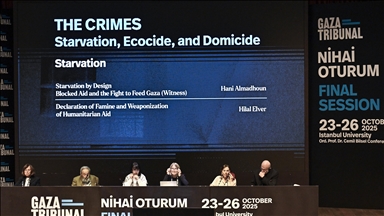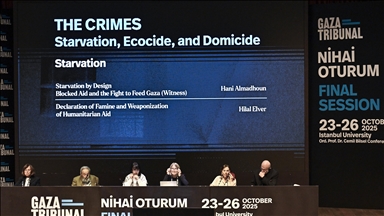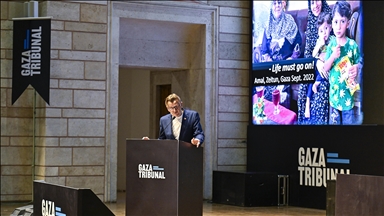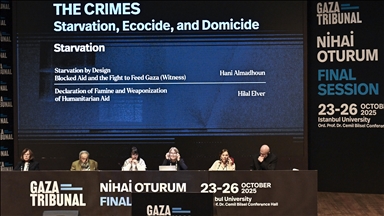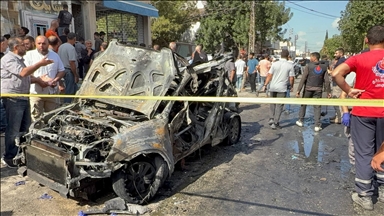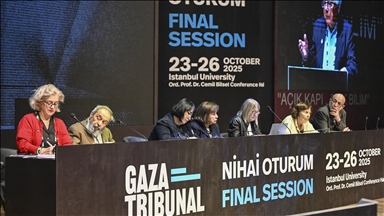Efforts for international military intervention to stop Israel in Gaza discussed
Protect Palestine, group calling for international military force to protect civilians, holds online workshop
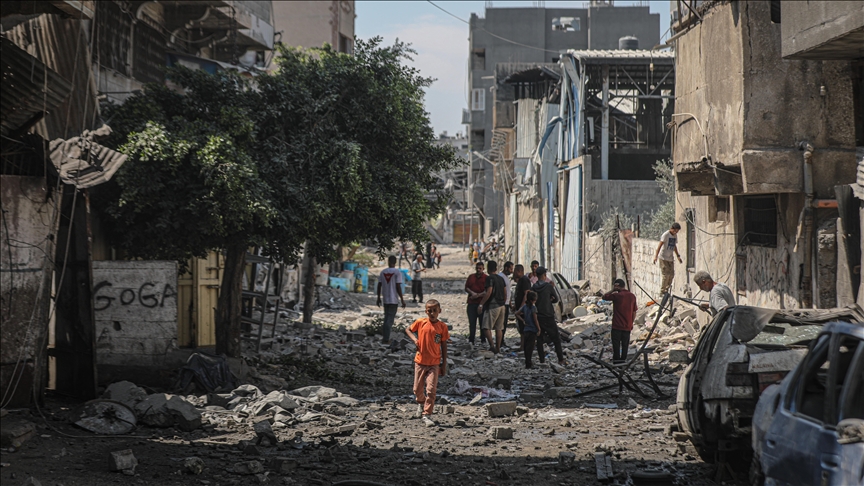
LONDON
Prominent Palestinian voices and human rights experts discussed on Saturday efforts to mobilize a military intervention to stop Israel’s war on Palestinians, warning that legal and diplomatic avenues have failed.
The interactive online workshop was organized by the Protect Palestine group, which explored how to mobilize and establish a coalition of willing states to conduct such an intervention.
Israel is expanding illegal settlements in the West Bank, which it occupied in 1967, and continues to bomb and destroy the Gaza Strip, where it has killed more than 62,000 people since October 2023.
Despite international demand for a ceasefire, Israel continues with its onslaught in Gaza.
The group argues that an international military force to protect civilians is now urgently needed.
'A genocide that’s unique in world history'
Mazin Butros Qumsiyeh, a Palestinian scientist at Bethlehem University, described the assault in Gaza as “a genocide that’s unique in world history in many ways.”
Unlike earlier atrocities, he argued, it is driven by multiple states, not just one. “This genocide … is not done by a single actor. In the case of Belgium in the Congo, it was basically one actor, King Leopold and his government. In this case, it’s many actors, many Western governments, that are full partners with the Zionist regime in perpetuating this genocide.”
Qumsiyeh said this time the perpetrators are not concealing their crimes. “The perpetrators, in this case, actually brag about it and are very proud of it and went publicly saying what they wanted to do… for example, by denying food and water and medicine.”
He warned that today’s technologies of mass killing could push the crisis into a global catastrophe. “This genocide could end civilization.”
He pointed to what he called “a Guinness Book of World Records, record of lies … the death of truth,” marked by the killing of hundreds of journalists in Gaza.
'Israeli regime will not end the genocide of its own will'
Craig Gerard Mokhiber, a former UN human rights official, made clear that Israel would not stop on its own.
“The Israeli regime will not end the genocide in Palestine of its own will. The regime, the majority of its people, its proxies and lobbies and sponsors in the West are fully committed to the genocide and to the destruction and erasure of every remnant of Palestine, from the river to the sea,” he said.
For Mokhiber, only coordinated resistance can succeed. “Genocide and apartheid will only end through resistance against the Israeli regime, the steadfastness of the Palestinian people, the solidarity of the rest of the world, and the isolation, weakening, defeat and dismantling of the Israeli regime, as it was in apartheid South Africa,” he said.
With famine now declared in Gaza, and with Israel “expanding its military presence and poised to provoke a wider war with Iran,” he argued that a deadline is approaching: “September 17, 18th … will mark the end of a one year deadline set by the UN General Assembly… That means the time to act is now. This can be done, and we have to at least try.”
The UN General Assembly adopted a resolution last September, demanding that Israel entirely pull out of Palestinian areas within a year.
The resolution welcomed a July ruling by the International Court of Justice that said Israel’s control of Palestinian territories and settlements is illegal and should be withdrawn.
'Inaction is not neutrality, it is complicity'
Palestinian-American author Susan Abulhawa delivered a psychological analysis of Israel’s strategy. She said that Israeli discourse has long regretted that former Prime Minister Ben Gurion did not “finish the job,” and that leaders are seizing “a once in a lifetime opportunity to steal prime land that comes with a vast natural gas resource worth trillions of dollars, and to simultaneously obliterate the indigenous Palestinian population.”
“They’re counting on all of you, on all of us, to remain paralyzed, to be floundering in this theater of words and performances of concern.”
Every peaceful and legal effort, she said, has already been sabotaged. “Inaction is not neutrality, it is not diplomacy, it is not self-preservation. It is complicity. It is surrender of your agency … and your very humanity to a fleeting political expediency.”
'Gaza is a rehearsal of the future'
Quoting Colombian President Gustavo Petro, she warned: “Gaza is a rehearsal of the future … a preview of how powerful nations will respond to challenges from less powerful ones, particularly in the Global South.”
She likened Israel’s tactics to “learned helplessness” and the “boiling frog principle,” in which incremental escalation conditions the world to accept atrocities.
“Israel’s occupation of Palestine has been a 75-year slow boil,” she said, comparing it also to a bully who escalates cruelty after every condemnation. “Condemnation follows, and then they respond by doing something even more unthinkable … to make it clear to all of us that no matter how much you protest, we will do worse.”
For Protect Palestine, the workshop was intended not only to diagnose the crisis but to chart a way forward.
The central question was how to build a coalition of willing states prepared to act militarily to halt what Qumsiyeh calls “a genocide that’s unique in world history.”
What unites these voices — a scientist, a lawyer, and a novelist — is a demand for urgency.
"The time to act is now," Mokhiber said. "This can be done, and we have to at least try."



